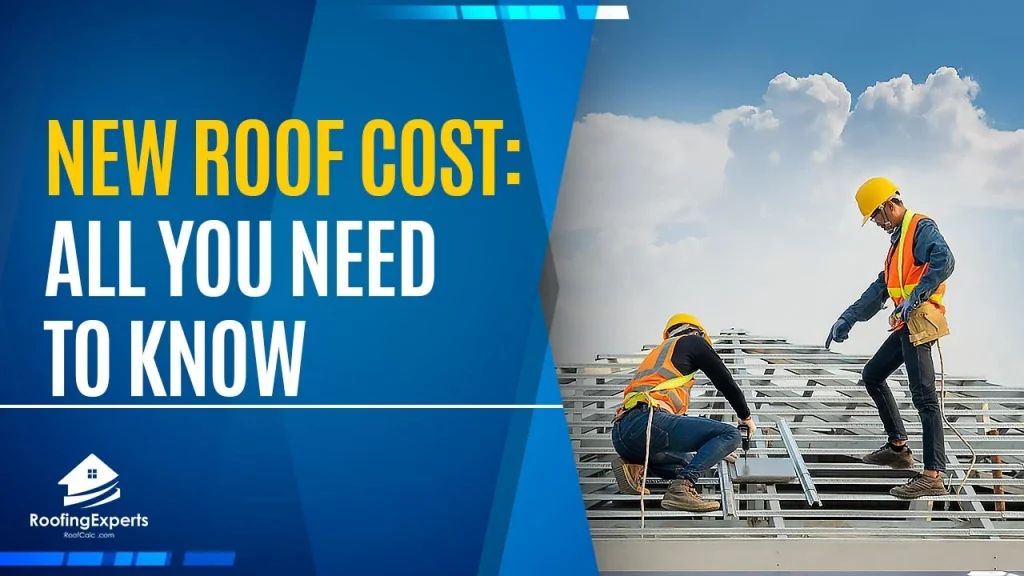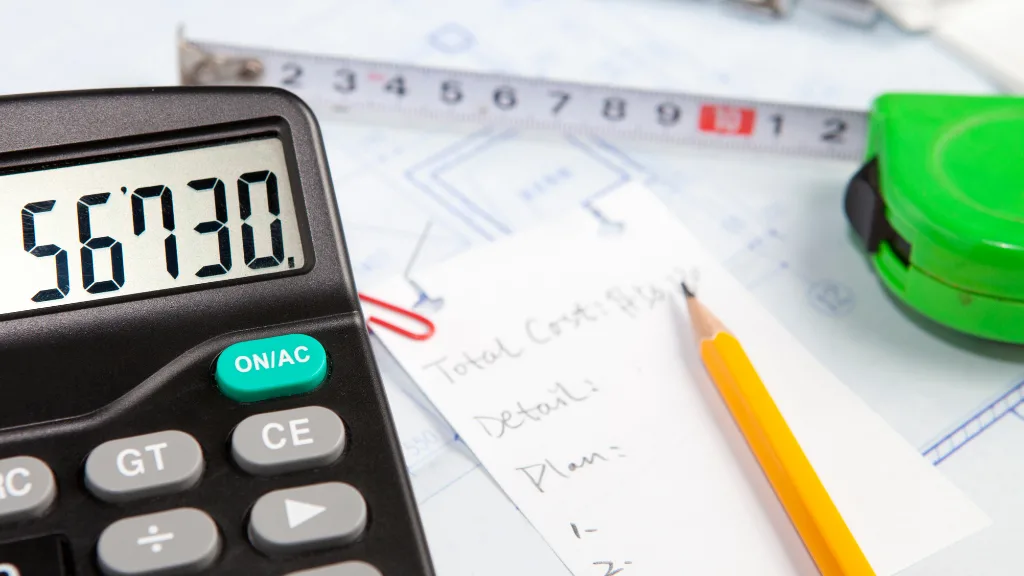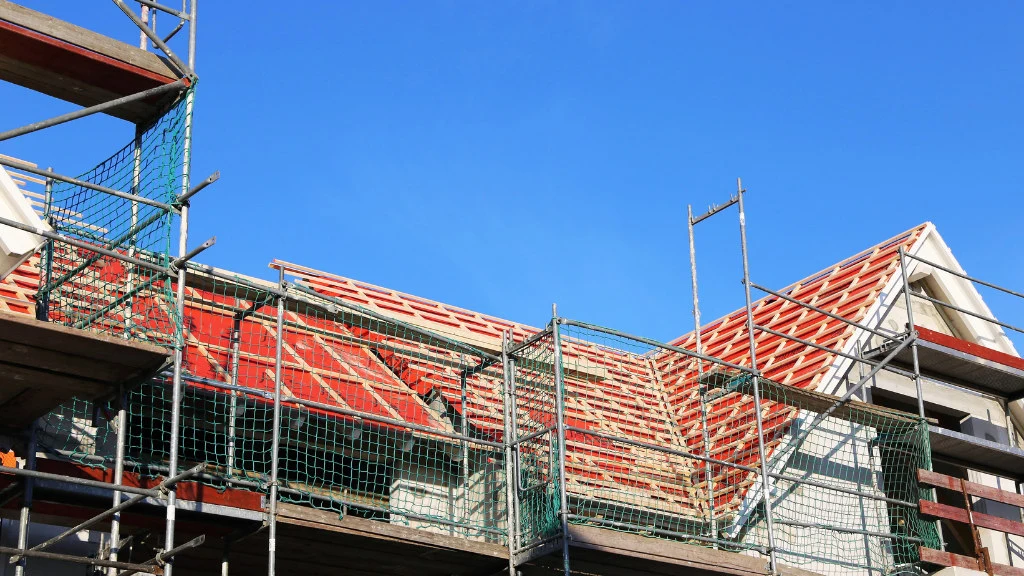
The cost of a new roof can be an expensive decision for any homeowner. For that reason, you should have all the information to make an informed decision about whether or not to install a new roof on your home.
- How Much Does a NEW Roof Cost?
- How About the Cost to Re-shingle a Roof?
- Cost in Replacing Your Architectural Asphalt Shingles
- Cost in Replacing a Asphalt Three Tab Shingles
- Factors That Affects the Cost of a New Roof
- Other Cost Influencing Factors
- What Does Roof Labor Include?
- Is Paying for a Roofing Material Warranty Essential?
- Is Paying for a Workmanship Warranty Part of the Roofing Cost?
- A New Roof or Roof Repairs – Which is Costly?
In this blog post, we will outline everything you need to know before making this important investment in your home!
How Much Does a NEW Roof Cost?
The typical cost of a roof replacement is between $1,200 and $30,000. Roofing companies typically charge between $3.50 and $5.00 per square foot, but in Des Moines, the average size is around 3,000 square feet.
The cost of replacing your roof depends on the square footage, material, and damage.
You’ll be getting a lower-quality roof with material that is of less quality.
Moving ahead with low-quality labor might lead to a roof replacement sooner, and it might even invalidate the warranty. Before hiring a roofing company, make sure they have insurance to cover any accidents.
How About the Cost to Re-shingle a Roof?
The cost of re-shingling a roof is around $7,200. If you want to know how much it will cost to re-shingle your roof, there are a number of things that can affect the price.
Related: Why You Should Get Multiple Quotes for Your Roof Replacement
If you want a cheaper replacement instead of replacing the entire roof, then you should just get a minor repair.
Depending on the materials and how many shingles need to be fixed or replaced, a roof can cost a lot of money. You can use a roofing calculator that estimates the average shingle repair costs around $650.
Cost in Replacing Your Architectural Asphalt Shingles
Architectural and laminate shingles last for about 30 or 50 years. Asphalt shingles are made of stronger material and have a better quality than three-tab shingles. The cost to install 30-year shingles is about $350-$500 per square.
50-year architectural shingles are stronger than regular shingles. This type of shingle may cost anywhere from $450 to $700+.
Roofing companies should offer a warranty for their premium-quality products. The warranty should be discussed before choosing your roofing material.
When you purchase a manufactured warranty, the company will require that you buy certain products in order to get an extended warranty.
Warranties for a flooring project typically cost an extra $8 to $20 per square, plus the upgrade fee. Contractors usually only offer high-quality products, so there will not be an additional cost.
Owens Corning has created shingles that can withstand winds of 110 – 130 mph. Premium Owens Corning shingles are designed to withstand storms.
Roofs are made of other materials and labor which factor into the overall price. The cost to replace your roof depends on the type of material you want, as well as how it will be installed.
Cost in Replacing a Asphalt Three Tab Shingles
The most expensive roofing material is three-tab asphalt shingles. A square of the material typically costs around $150 to $200.
Local municipalities abide by the International Building Code, but many still believe that this material is still susceptible to wind damage.
Companies should be careful if they are recommending 3-tab shingles to their customers because most of them do not meet the minimum requirements for wind speeds.
Owens Corning shingles are resistant to 60 mph winds and include 10 years of algae resistance. The material would be used for a roof, but it does not meet the code.
Storm winds can come in at over 60 mph, so it is best to upgrade your roofing material for long-term savings.
Factors That Affects the Cost of a New Roof
The cost of a new roof is determined by many factors, including the material that will be used.
Replacing your roof varies in cost based on the materials and time required to complete the task. Shingles, labor, and other small parts are all factors in the cost of a roof replacement.
There are factors that affect the cost:
Material: The type of material used for the roof will affect the cost. Slate roofs are more expensive than asphalt, and metal is often a pricier option too.
If you want to use slate or another exotic material, be prepared to spend between $1200-$30000 per square foot on your new roof! This can add up quickly if the roof is large.
- Underlayment – Quality underlayment is required to protect your roof. A good quality underlay will be depending on the material used and thickness of the product.
- Gutters – Gutters are another factor that can affect the price of a new roof replacement because they need to be custom built into each project for the best fit.
- Flashing – Flashing is used on vent pipes, skylights and chimneys to prevent water leaks. It can be made of metal, rubber or plastic. The more durable the flashing material you want, the higher price it will be.
- Nails – Roofing nails are another factor that can affect the overall cost of your project. Some companies use a plastic nail, which is less expensive than metal roofing nails and will not rust over time.
- Ice & Water Barrier – This layer protects the roof from water that gets through other layers.
- Ventilation – A ventilation system is required for every roof. This prevents moisture and mold, which can lead to leaks in your roofing material.
- Drip Edge – A drip edge prevents water from dripping down the side of your roof.
Roofing companies will factor in all of these things when they give you a quote for how much it costs to replace your roof.
They may also ask if you want any upgrades, such as thicker shingles or premium underlayment, which can increase the cost a bit.
Slope: The pitch of your roof can also affect how much it will cost to replace the shingles, as well as other factors that go into installation costs.
If you have a steeper pitched roof, this could be significantly more expensive than installing on a flatter section. So if possible choose materials with an appropriate slope.
Weather: The weather in your area can also affect the cost of a new roof, as rooftop work is often delayed when there are severe storms or heat waves.
In addition to climatic conditions, you should be aware that colder places have higher prices due to more expensive materials and shorter construction seasons. You’ll find that many companies quote a “winter rate” during the winter season.
Other Cost Influencing Factors
- If you have a larger roof, it will take more time to complete and cost more money for your new roofing job.
- In addition, large roofs are harder work than smaller ones so companies may quote higher prices accordingly.
- Also if there is asbestos in your current shingles this will affect the cost, as companies sometimes need to take more time for this part of roofing.
- If you have a flat roof it will be cheaper than a pitched one because there is no extra work involved in working on slope and they are often installed by less experienced installers too.
- If your home has a smaller area that needs new shingle installation, this will cost less than an entire roof replacement.
- It’s important to note that if you have a roof with multiple layers of shingles, the job will be more expensive than having one layer replaced.
- If your home has skylights or chimneys this may increase the total cost as they need special weather stripping and extra flashing materials too.
- In addition, if there are any damaged tiles on the roof, this will also increase the cost of replacement.
- If you have a new type of shingle but your current material is still in good condition and can be reused it may lower the overall price due to less waste for removal and disposal.
If your roof estimate is higher than expected, you may need to replace the entire roof. If you experience a storm, make sure to fix the roof right away. The price of plywood has risen due to the shortage of lumber for it.
What Does Roof Labor Include?
What kind of work is included in roof labor? How much does your typical roof job cost? What do you get for the money you pay to get it done?
It depends on what you’re looking for. Your roofer will need to give you an estimate, but here are some basics that might help.
Roof labor includes the work to install but not materials. Roof materials are sold separately by the company that provides them. The labor to install those materials will be included in the final price, however.
Some roofers will inspect your roof and give you an estimate of the cost to put on a new one as well as repairs such as shingles or other damage. What they don’t include is the material for your roof if you’ve requested that.

Is Paying for a Roofing Material Warranty Essential?
The roof over your head is the most important item to consider when it comes to home building and maintaining a healthy, livable environment.
A roof will generally last anywhere from 15-35 years (while some hope for 50 years), which means one bad purchase could leave you high and dry for many years.
Because of this, it’s important to take your time when selecting the best roofing material for you.
A material warranty is basically an agreement between you and your contractor that if the contractor installed the wrong product, or the product fails before a certain period of time, you’ll get your money back. But is it worth spending extra money for?
Paying for a warranty is not necessary, but it can be beneficial to you depending on the price of materials and your preference.
If the warranty is only a few hundred dollars, it’s probably not worth your time or money.
You can typically find materials with warranties that are only a few bucks more expensive anyway. However, if prices on materials vary greatly and you’re looking for a lower-priced option, a warranty may be worth your while.
It’s also good to keep in mind that the warranty is not a guarantee.
Your roof is subjected to harsh weather and high heat, which might damage your materials more than advertised.
And if the warranty only covers natural wear and tear (versus accidental damage), there’s no point in shelling out extra money for one. On top of this, most warranties don’t cover damage caused by the installation or bad maintenance.
Is Paying for a Workmanship Warranty Part of the Roofing Cost?
A roofing contractor is a business that specializes in installing and repairing roofs. A roofing contractor will usually have their own specialty, such as residential or commercial roofing, but some companies have talents across the board.
Generally speaking though, a qualified company will offer each service that needs to be done with a specific project.
The typical way you will choose the roofing contractor is by getting estimates. The roofer will visit your home and give you an estimate on what they can do for you.
You may ask how much this or that costs extra, and in some cases, these extra-cost options are substantial enough to make a change in your decision to hire them.
One option you might see is a workmanship warranty. This may or may not come with the option of paying extra to have it included in your final price and insured against damage. Is this something you should consider?
The Workmanship Warranty: Pros & Cons
A workmanship warranty guarantees that no matter what happens, the workmanship will be covered for up to one year after the roof is complete.
Not everything that happens during that year will be covered of course, but at least you know you won’t have to pay for anything your contractor does on your property until a year has passed.
Most contractors who offer these warranties on their work feel pretty confident in what they do and want to guarantee you satisfaction with their work.
That being said, the warranty is only valid if your contractor does something wrong. If you have shoddy workmanship or materials, this guarantee won’t help at all.
Additionally, some contractors price their jobs higher to include a workmanship warranty. They may not charge extra for it but factor it into the overall cost of your project before you even see the final price.
The general consensus is that a workmanship warranty will not hurt your project in any way, and most likely they won’t be needed because most roofers do quality work.
However, you’d have to weigh the cost of this option against what it could save you in the future before you make a decision for yourself.
A New Roof or Roof Repairs – Which is Costly?
There are many homeowners that want to keep their homes well-maintained over the years, but sometimes a homeowner will have a hard time knowing when upkeep is needed or if an issue can be fixed.
Many people think that it is cheaper to just put a new roof on a home as opposed to fixing repairs from previous damage. After all, many times a roof will last upwards of 20 years or longer, so why not just replace them when needed?
Actually, repairing the damage on an existing roof is much cheaper than installing a new one.
The truth is that insurance companies have paid out more for defective roofs in the past two decades than they have in actual claims because many contractors are being paid out for liability claims.
In most cases, the contractor is not even liable for their work because they have a disclaimer that they are just installing what is being covered by insurance.
This is why it may be expensive to repair a roof but much cheaper than installing a new one. So next time a roof is damaged or needs repairs, homeowners should consider hiring a professional before just putting on a new roof.
Having a new roof is of advantage to you in saving more from the cost of just repairing, because:
1. You need not go through the process of removing old roofs or gutters from your home because a new roof will come with it.
2. You may have to dig deep in your pocket if you want to repair an old roof, but if you have a new one you get to enjoy the best at a budgeted price.
3. You will also be paying less on the energy bills since a new roof is more efficient in keeping warm or cool air inside your home.
4. A new roof requires low maintenance, thus sparing you the time and money of repairing after every little damage.
5. New roofs are made with shingles that are better equipped to withstand harsh weather, such as heavy winds and snowfall.
6. Your home is also protected from getting water leakage in your ceilings and walls when it rains or snows outside.
7. You will not have to go through the stress of worrying over damage caused by hail and flying debris because a new roof already has your back covered.
8. You will not have to remove debris when it accumulates because a new roof will be installed with a ridge vent that allows warm air to escape through the top.
9. New roofs are heat resistant and fireproof, thus you shall rest easy knowing that your house is safe from common damages brought on by the weather.
10. A new roof adds value to your home; since it is more attractive, you can expect a higher resale value.
11. A new roof has better warranty terms than repairing an old one — which means you will not be forced to spend money on repairs for years.
New roofs are more efficient in energy conservation because of the materials used; this way you will be able to keep more money in your pocket. It is wiser to go for a new roof than to spend on repairing the old one.
That way, you not only get rid of problems but also save money by having it at low-cost maintenance. Have a new roof installed and enjoy the many perks it has to offer.


